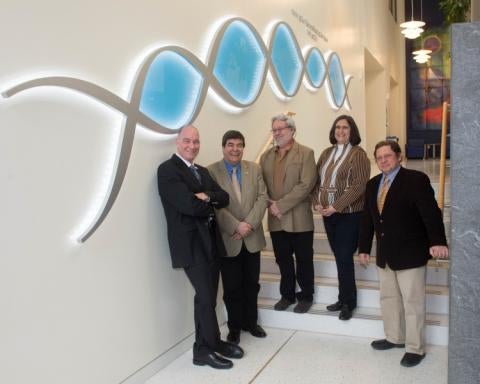
University of Pittsburgh School of Dental Medicine Receives Funding to Establish NIDCR Consortium for Tissue Regeneration Therapies
PITTSBURGH, March 17, 2017
The University of Pittsburgh School of Dental Medicine received an $11.7 million grant from the National Institute of Dental and Craniofacial Research (NIDCR) to establish a resource center dedicated to advancing therapies for regenerating damaged dental, oral and craniofacial tissues.
Officially named the Michigan-Pittsburgh-Wyss Resource Center: Supporting Regenerative Medicine in Dental, Oral and Craniofacial Technologies, Pitt established the center in partnership with the University of Michigan and Harvard University as part of the NIDCR’s Dental, Oral, and Craniofacial Tissue Regeneration Consortium (DOCTRC). The goal of the consortium is to guide new therapies from the research stages through preclinical studies and into human clinical trials.
“There is tremendous value in craniofacial regenerative medicine research, and our goal is to create therapies and technologies that help patients,” said Charles Sfeir, D.D.S., Ph.D., principal investigator, associate dean for research and director of Pitt’s School of Dental Medicine Center for Craniofacial Regeneration. “This newly established consortium is dedicated to making the most promising research in this field a clinical reality, and we are proud to be part of this effort at the University of Pittsburgh.”
Pitt, Michigan and Harvard researchers joined forces during an initial year-long organizational phase funded by an NIDCR planning grant. The current award provides funding for a second three-year phase, which will consist of researchers evaluating projects based on their clinical and commercial viability. The resource center will then match selected projects with the clinical, scientific, industrial and regulatory expertise necessary to more efficiently translate the research into clinical trials and eventually clinical practice.
The University of Pittsburgh is uniquely positioned as a leading tissue regeneration hub with a proven record of translating tissue engineering therapies. In addition, the integration between the Center for Craniofacial Regeneration and the McGowan Institute for Regenerative Medicine provides outstanding expertise in regenerating dental and oral cranial tissues.
“This opportunity leverages our substantial base of researchers and support personnel in the regenerative medicine space and provides a focus on the unique challenges faced in the craniofacial area,” said William Wagner, Ph.D., director of Pitt’s McGowan Institute for Regenerative Medicine. “I am confident that the investment from the NIH will result in meaningful progress of new therapies toward patients with needs for craniofacial tissue therapy.”
Sfeir and Wagner are the principal investigators at the resource center in Pittsburgh. David Kohn, Ph.D., and William Giannobile, D.D.S., from Michigan; and David Mooney, Ph.D., from Harvard, will serve as principal investigators at their universities.
In addition to Pitt’s resource center, a second center based at the University of California, San Francisco also received funding from DOCTRC. Total NIH funding for both resource centers amounts to $24 million over three years.
For more information about Pitt’s regenerative medicine research, please visit the Center for Craniofacial Regeneration and the McGowan website.
About the University of Pittsburgh School of Dental Medicine
Established in 1896 as an independent institution named the Pittsburgh Dental College, the School of Dental Medicine was incorporated into the University of Pittsburgh in 1905. The school offers a four-year predoctoral Program leading to a Doctor of Dental Medicine (DMD) degree, an international Advanced Standing Program for graduates of foreign dental schools, and post-graduate residency programs in 11 disciplines. Additionally, the school of Dental Medicine offers the only dental hygiene certificate program in Pennsylvania affiliated with a major university, as well as a dental hygiene baccalaureate degree program. The School of Dental Medicine’s comprehensive clinical offerings include the Multidisciplinary Implant Center and the Center for Patients with Special Needs, one of the few centers in the U.S. dedicated to training future dentists to care for patients with disabilities. Recognized for excellence in research, the School of Dental medicine is a top tier ranked National Institute of Dental and Craniofacial Research (NIDCR) institution.

